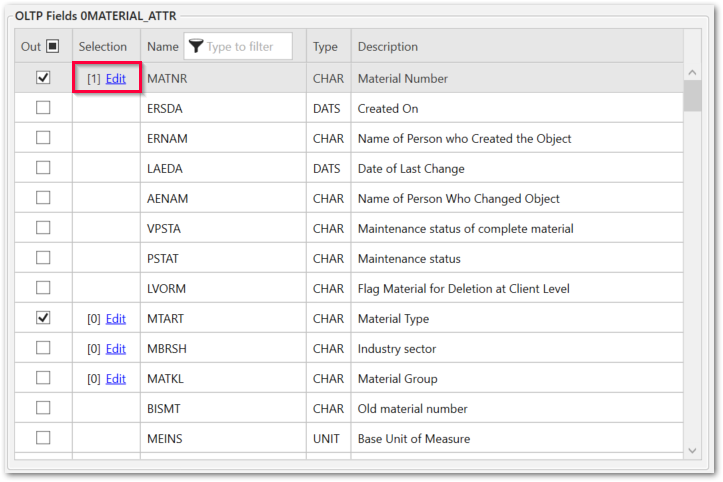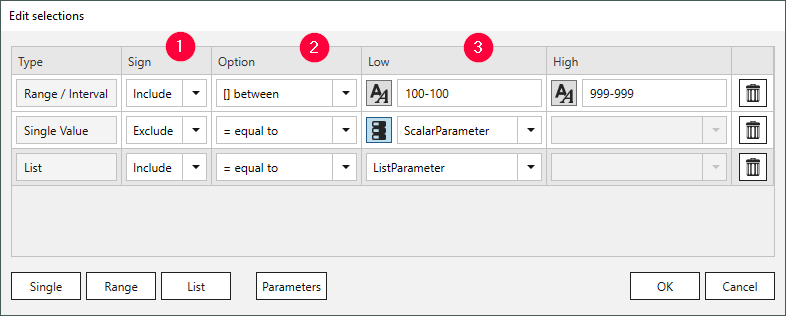Edit Selections #
Note: Do not define selections when using the update mode Delta Update, because the selections of the Init mode are automatically applied.
Follow the steps below to edit selection fields and filter data:
- Click [Edit] next to the selection field you want to edit. The window “Edit selection” opens.

- Add one or more of the following filter types:
a) Click [Single] to compare the data to a single specified value.
b) Click [Range] to check if the data is (not) within a specified range of values.
c) Click [List] to check if the data is (not) part of a specified list of values. - In the Sign column (1), select Include to add the filtered data to the output or select Exclude to remove the filtered data from the output.

-
Select an operator in the Option column (2). The operator filters data according to the table below.
Operator Meaning (not) like pattern True if data values do (not) contain to the content of operand 1. (not) equal to True if data is (not) equal to the content of operand 1. at least True if data is greater than or equal to the content of operand 1. more than True if data is greater than the content of operand 1. at most True if data is less than or equal to the content of operand 1. less than True if data is less than the content of operand 1. (not) between True if data values do (not) lie between the values of operand 1 and operand 2. elements of True if data values are part of operand 1. This option is only available for type List. - Enter values or assign runtime parameters to the selection fields (3).
a) Static values: Enter values directly into the Low and High input fields. If runtime parameters are available, make sure that the icon is displayed next to the input field.
Clicking on the icon switches between static and dynamic input values.
icon is displayed next to the input field.
Clicking on the icon switches between static and dynamic input values.
b) Runtime parameters: Click to change the input type to dynamic values
to change the input type to dynamic values  .
Select an existing runtime parameter from the drop-down list.
.
Select an existing runtime parameter from the drop-down list. - Click [OK] to confirm your input.
- Click [Load Preview] in the main window of the component to check the result of your selection.
If runtime parameters are defined, you are prompted to populate the parameters with actual values.
Script Expressions #
Script expressions are supported. Script expressions are usually used to determine a dynamic date based on the current date.
Examples:
| Input | Output | Description |
|---|---|---|
#{ DateTime.Now.ToString("yyyyMMdd") }# |
yyyyMMdd | Current date in SAP format |
#{ String.Concat(DateTime.Now.Year.ToString(), "0101") }# |
yyyy0101 | Current year concatenated with “0101” |
#{ String.Concat(DateTime.Now.ToString("yyyy"), "0101") }# |
yyyy0101 | Current year concatenated with “0101” |
#{ String.Concat(DateTime.Now.ToString("yyyyMMdd").Substring(0,4), "0101") }# |
yyyy0101 | Current year concatenated with “0101” |